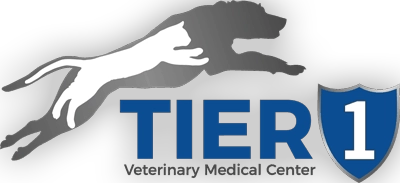Small animal pets, like domesticated cats and dogs, are not known to be susceptible to the COVID-19 (Coronavirus).
Vaccinations for Pets During Coronavirus Outbreak

There is no vaccine for COVID-19 at this time.
However, pet owners should use this as an opportunity to ensure that their pets are up to date on their shots.
The Doctors and Veterinary Team at Tier 1 Veterinary Medical Center are volunteering to host a Vaccination Clinic.
As part of our commitment to community outreach, we want to ensure that we are being a part of the solution to prepare ourselves in a prudent manner.
The Vaccination Clinic (shot clinic at Tier 1 Veterinary Medical Center) will be providing discounted shots for dogs and cats to ensure we can reach as many members of our community as possible.
In addition, we will be opening our supplies of high caloric and specialized dietary foods for our community to purchase. If you are concerned about having food on hand for your pets, we want to ensure this is addressed.
The availability of these items, including vaccinations, will be available only during the scheduled vaccination clinic times and as supplies last.

During the vaccination clinic at Tier 1 Veterinary Medical Center, our Doctors of Veterinary Medicine will not be performing complete examinations of pets due to limited time and availability.
However, if you need to schedule a time to meet with us we are happy to schedule an appointment for you.
Supply Chain Disruption for Your Pets
Yes, it is likely that the supply chain will be disrupted due to the Coronavirus.
What does this mean for you and your pets?
Pet owners should not panic. However, you should be cognizant of ensuring that you have a good supply of food and medications on hand in the event of delays.
Here are the things that you should consider,
- Dietary Supplies – particularly if your pets are on a specialty diet.
- Medications – communication with your regular veterinarian to ensure you have two weeks of medication on hand.
For those that need additional supplies and find that their regular veterinarian is unable to meet those needs, please contact us.
Tier 1 Veterinary Medical Center works with veterinarians all over our state in a referral capacity and we are happy to help.

American Association of Veterinary Medicine Has Stated When it Comes to Your Pets and COVID-19
Here’s some key information about COVID-19 that the American Association of Veterinary Medicine published:
- “The betacoronavirus that causes COVID-19 is SARS-CoV-2 (formerly 2019-nCoV).
- Person-to-person spread has been reported in numerous countries, including the United States. Some popular international destinations, including the United States, also appear to have community spread.
- Transmission seems to occur when there is contact with an infected person’s bodily secretions, such as saliva or mucus droplets in a cough or sneeze.
- There are currently no antiviral drugs recommended or licensed by FDA to treat COVID-19, and there is no immunization available.
- For most people in the United States, the immediate risk of being exposed to SARS-CoV-2 is believed to be low, but the CDC considers the virus a very serious public health threat.
- The best way to avoid becoming ill is to avoid exposure to the virus. Taking typical preventive actions is key.
- Infectious disease experts and multiple international and domestic human and animal health organizations agree there is no evidence at this point to indicate that pets become ill with COVID-19 or that they spread it to other animals, including people.
- Out of an abundance of caution, it is recommended that those ill with COVID-19 limit contact with animals until more information is known about the virus. Have another member of your household take care of walking, feeding, and playing with your pet. If you have a service animal or you must care for your pet, then wear a facemask; don’t share food, kiss, or hug them; and wash your hands before and after any contact with them.
- As always, careful handwashing and other infection control practices can greatly reduce the chance of spreading any disease. The National Association of State Public Health Veterinarians’ (NASPHV) compendium of standard precautions is a good reference for appropriate infection control in veterinary practices.”
